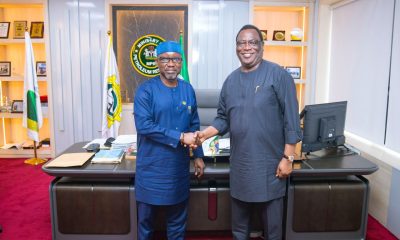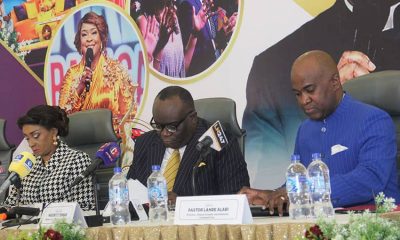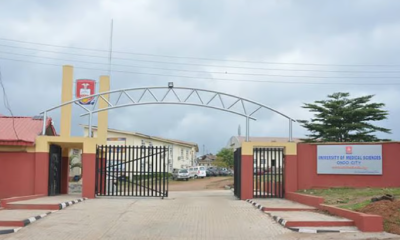Business
Niger Delta Blue Economy: UN group identifies $1.5trn blue opportunities
Published
1 year agoon

…as expert raises environmental concerns
As Nigeria Blue Economy Stakeholders step up engagements through the Niger Delta Blue Economy Investment Forum to change the dynamics of the crude oil dependent region to a new future that is green and sustainable with practical projects, the United Nations Global Compact has drawn an attention to some blue investment opportunities that can be harnessed at a time when global sustainable bond issuance is sets to surpass $1.5 trillion in 2022.
In his presentation at the Niger Delta Blue Economy Investment Forum holding at Monty Suites and Golf Resort, Uyo, Akwa Ibom State capital from November 15-17, 2022, Mr. Erik Giercksky of the UN Global Compact Sustainable Ocean Business Action Platform said, while green bonds clearly address climate and environmental issues, the blue bond can relate to all Sustainable Development Goals (SDGs), reflecting the diversity of factors relevant for sustainable ocean business including fair labor conditions, climate change, waste reduction, and gender equity.
“Using a blue label can show stewardship, in terms of emission reduction in the ocean, but also in ways that may not be fully expressed in a green instrument,” he said.
At the three-day forum organized by Alfe City Institution in collaboration with Ministry of Niger Delta Affairs, Giercksky who addressed the forum virtually from New York listed benefits for blue bond which can be issued by sovereign countries, multilateral development banks, banks, large and medium-size companies to include enhance credibility of sustainability strategy; improve diversity of investor base; create opportunities for larger and longer-term financing; potential improved financing costs; reputation benefits; and internal benefits.
READ ALSO: Ijaw Diaspora Council launches fund raising for flood victims in Niger Delta
The theme of the forum hosted by the Akwa Ibom State government and supported by Nigerian Maritime Administration and Safety Agency (NIMASA), Nigerian Ports Authority (NPA) and National Inland Waterways Authority (NIWA) is ‘Preparing for a Future Less Reliant on Crude Oil’.
In a presentation titled ‘The Niger Delta Endemic Environment: Challenges and the way forward’, Mr Hilary Efanga, a researcher and Senior Lecturer with the Maritime Academy of Nigeria, Oron identified oil spillage/gas flaring and other form of pollution as some of the major negative impacts on Niger Delta citizens, the environment and its economy, particularly the blue economy that must be urgently addressed for the blue economy to thrive.
“Central to the poor state of affairs is the largely obsolete laws and regulations in the Nigerian oil industry which have been outpaced by the prevailing technology for crude oil development and use,” he said.
“The communities in the Niger Delta region have become the recipient of environmental degradation. Government failure to implement appropriate policies to ameliorate the devastated region has exacerbated the phenomenon. Therefore a comprehensive or holistic approach is necessary to address the social and economic predicaments of the people living in the Niger Delta region.”
Calling on the Nigerian government to learn a lesson from how other countries effectively managed spill cases and adopt same as in the case of the Exxon Valdez Oil Spill and Prestige oil spill disasters, the researcher said, “The cause of oil spill can lead to very disastrous situation as such should be treated as national emergency by the Nigerian government whenever it occurs. Not just because this is the case in other regions, but because it is the responsibility of the government to protect its environment.
“Nigeria seems to depend largely on foreign experts for spill management; this approach may not add local content value. Therefore, the country should embark on expansion of local knowledge of spill management through technology knowledge transfer.
As for the private companies, he said they are not blameless, as they had not demonstrated commendable corporate social responsibilities in either their operations or their relationship with host communities regarding the effects of their activities on the environment.
READ ALSO: Stolen petroleum products worth N538M recovered by troops in Niger Delta – DHQ
“For decades of operations in the Niger Delta, the oil companies have not been significantly involved in the development of the host communities which is the reason for the grievances between parties. Therefore, with the provision of the new PIA, the government should establish an effective monitoring mechanism to ensure that the host communities receive optimal benefits this time,” he said.
“The Nigerian government must be proactive in both regards to control of oil pollution, management and biodiversity conservation by enforcing existing regulation, laws and policies in place, this can be achieved by enormous political support – the determination to enforce the regulations and strengthening the judiciary system especially in oil spill related cases.”
Mr. Soji Adeleye, the Chief Executive of Alfe City Institution in his opening remarks listed the objectives of the Niger Delta Blue Economy Investment Forum to include Advance the national discuss on the imperative of a Blue Economy in Nigeria through practical demonstration of actual projects at the state level.
Adeleye, a member of the Expanded Partnership Committee on Sustainable Blue Economy chaired by Vice President Yemi Osinbajo (SAN) said, “The Blue Economy solution calls for decongestion of Lagos; to reduce the pressure on the Apapa port by encouraging the construction of new sea ports along the coast that can serve the other parts of the country.
“There should be at least 27 functional ports of varying sizes serving a growing population that is rapidly approaching a quarter of a billion people. The case for construction of new sets of sea ports along the Nigeria Atlantic Coast which these littoral states are ready to undertake is overwhelming.”
It will be recalled that major stakeholders in Nigeria’s blue economy had at a three-day ‘The Nigeria Blue Economy Stakeholders Conference’ in Lagos between February 15-17, 2022 made a case for urgent formulation of National Policy on Blue Economy to harness the immense potential in the ocean ecosystem.
Trending

 Business5 days ago
Business5 days agoOn The Central Bank Of Nigeria’s Circular Relating To The Collection And Remittance Of The National Cybersecurity Levy

 Politics4 days ago
Politics4 days agoReactions as Tinubu appoints Emeka Woke, CEO, Ogun-Osun River Basin Dev Authority, after resignation from Fubara’s cabinet in Rivers

 Featured4 days ago
Featured4 days agoTinubu confers national honour on Awujale of Ijebu

 Business4 days ago
Business4 days agoNCDMB co-chair, Ekpo meets Exec Sec, pledges support for local content programmes

 Latest4 days ago
Latest4 days agoOne shot as detained soldiers break out of ‘overcrowded cells’ to protest poor feeding

 Business6 days ago
Business6 days agoNaira depreciate further at official, parallel markets

 Inspirational5 days ago
Inspirational5 days agoExcitement as Christ Embassy announces date for 2024 edition of Rhapathon with Pastor Chris

 Education4 days ago
Education4 days agoUNIMED dismisses Deputy VC over false allegations against management




